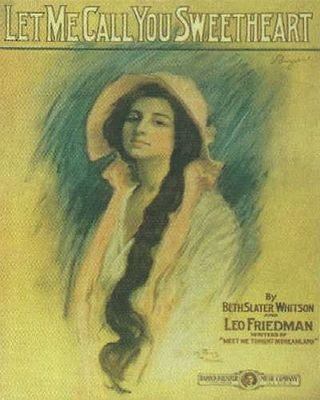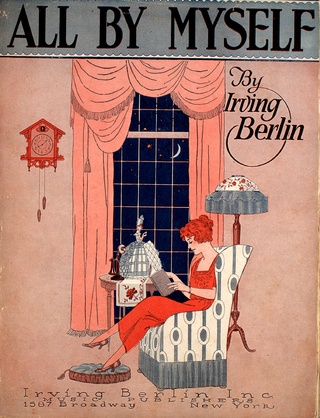Related Research Articles
"Something's Gotta Give" is a popular song with words and music by Johnny Mercer in 1954. It was published in 1955. It was written for and first performed by Fred Astaire in the 1955 musical film Daddy Long Legs, and was nominated for an Academy Award in 1955 as Best Original Song, losing to "Love is a Many Splendored Thing" from the film of the same name.
"There's No Business Like Show Business" is an Irving Berlin song, written for the 1946 musical Annie Get Your Gun and orchestrated by Ted Royal. The song, a slightly tongue-in-cheek salute to the glamour and excitement of a life in show business, is sung in the musical by members of Buffalo Bill's Wild West Show in an attempt to persuade Annie Oakley to join the production. It is reprised three times in the musical.
"It's De-Lovely" is one of Cole Porter's hit songs, originally appearing in his 1936 musical, Red Hot and Blue. It was introduced by Ethel Merman and Bob Hope. The song was later used in the musical Anything Goes, first appearing in the 1956 film version ; in the 1962 revival where it was sung by Hal Linden and Barbara Lang, and in the 2004 biographical film De-Lovely, where it was performed by Robbie Williams.

"A Fine Romance" is a popular song composed by Jerome Kern with lyrics by Dorothy Fields, published in 1936.
"Please Don't Talk About Me When I'm Gone" is a song published in 1930. It was written by Sam H. Stept with lyrics by Sidney Clare. The original publication also credited singer Bee Palmer as co-composer.
"This Can't Be Love" is a show tune and a popular song from the 1938 Rodgers and Hart musical The Boys from Syracuse when it was sung by Eddie Albert and Marcy Westcott. The lyrics poke fun at the common depiction of love in popular songs as a host of malignant symptoms, saying, "This can't be love because I feel so well."

"Let Me Call You Sweetheart" is a popular song, with music by Leo Friedman and lyrics by Beth Slater Whitson. The song was published in 1910 and was a huge hit for the Peerless Quartet in 1911. A recording by Arthur Clough was very popular the same year too. A 1924 recording identifies a Spanish title, "Déjame llamarte mía".

"You'd Be Surprised" is a song written by Irving Berlin in 1919 which Eddie Cantor interpolated it into Ziegfeld's Follies of 1919. Cantor soon recorded it and it became a major hit. Other popular versions in 1920 were by the All-Star Trio and by Irving Kaufman.
"Street of Dreams" is a song and foxtrot composed in 1932 by Victor Young, with lyrics by Sam M. Lewis. There were three successful recordings of the song in 1933 by Guy Lombardo, Ben Selvin and Bing Crosby.
"I've Got a Crush on You" is a song composed by George Gershwin, with lyrics by Ira Gershwin. It is unique among Gershwin compositions in that it was used for two different Broadway productions: Treasure Girl (1928), when it was introduced by Clifton Webb and Mary Hay, and Strike Up the Band (1930), when it was sung by Doris Carson and Gordon Smith. It was later included in the tribute musical Nice Work If You Can Get It (2012), in which it was sung by Jennifer Laura Thompson. When covered by Frank Sinatra he was a part of Columbia records.
"Witchcraft" is a popular song from 1957 composed by Cy Coleman with lyrics by Carolyn Leigh.
"Isn't This a Lovely Day?" is a popular song written by Irving Berlin for the 1935 film Top Hat, where it was introduced by Fred Astaire in the scene where his and Ginger Rogers' characters are caught in a gazebo during a rainstorm. The lyric is an example of a song which turns a bad situation into a love song, a common style for Irving Berlin, as in I've Got My Love to Keep Me Warm and Let's Have Another Cup of Coffee.
"Now It Can Be Told" is a popular song written by Irving Berlin for the 1938 film Alexander's Ragtime Band, where it was introduced by Alice Faye and Don Ameche. It was nominated for an Academy Award in 1938 but lost out to "Thanks for the Memory".
"You Keep Coming Back Like a Song" is a popular song written by Irving Berlin for the 1946 film Blue Skies, where it was introduced by Bing Crosby. The song was nominated for "Best Song" in 1946 but lost out to "On the Atchison, Topeka and the Santa Fe". Dinah Shore's version was biggest in the US reaching the No. 5 spot, while Crosby's version peaked at No. 12. Jo Stafford also had chart success with it and her version achieved the No.11 position.
"The Best Thing for You (Would Be Me)" is a popular song written by Irving Berlin and published in 1950. It was featured in the 1950 Broadway musical play, Call Me Madam, in which it was introduced by Ethel Merman in a scene with Paul Lukas. The 1953 film version also featured the song when it was sung by Ethel Merman and George Sanders.
"I Let a Song Go Out of My Heart" is a 1938 composition by Duke Ellington, with lyrics added by Irving Mills, Henry Nemo and John Redmond. The song became a number one hit for Ellington in 1938. Other hit versions the same year were by Benny Goodman, Connee Boswell, Hot Lips Page, and Mildred Bailey. It was performed as part of The Cotton Club Parade of 1938.
"Do I Love You?" is a 1939 popular song written by Cole Porter, for his musical Du Barry Was a Lady, where it was introduced by Ronald Graham and Ethel Merman.
"Lazy" is a popular song written by Irving Berlin in 1924. Popular recordings of the song in 1924 were by Al Jolson, Blossom Seeley, Paul Whiteman and the Brox Sisters. The best known version today may be that performed by Marilyn Monroe, Donald O'Connor, and Mitzi Gaynor in the motion picture There's No Business Like Show Business.
"(You'd Be So) Easy to Love" is a popular song written by Cole Porter for William Gaxton to sing in the 1934 Broadway show Anything Goes. However Gaxton was unhappy about its wide vocal range and it was cut from the musical. Porter re-wrote it for the 1936 film Born to Dance, where it was introduced by Eleanor Powell, James Stewart, and Frances Langford under its alternate title, "Easy to Love". The song was later added to the 1987 and 2011 revivals of Anything Goes under the complete title "You’d Be So Easy to Love".

"All by Myself" is a popular song written by Irving Berlin, published in 1921.
References
- 1 2 Flinn, Caryl (2009). Brass Diva: The Life and Legends of Ethel Merman. Berkeley: University of California Press. p. 98. ISBN 978-0520260221 . Retrieved June 18, 2012.
- ↑ Whitburn, Joel (1986). Joel Whitburn's Pop Memories 1890-1954 . Wisconsin, USA: Record Research Inc. p. 508. ISBN 0-89820-083-0.
- ↑ "Discogs.com".
- ↑ "allmusic.com". allmusic.com. Retrieved June 9, 2017.
- ↑ "45cat.com". 45cat.com. Retrieved June 9, 2017.
- ↑ "Discogs.com". Discogs.com. Retrieved June 9, 2017.
- ↑ Heatwave: Patti LuPone Sings Irving Berlin overview at AllMusic